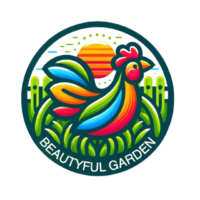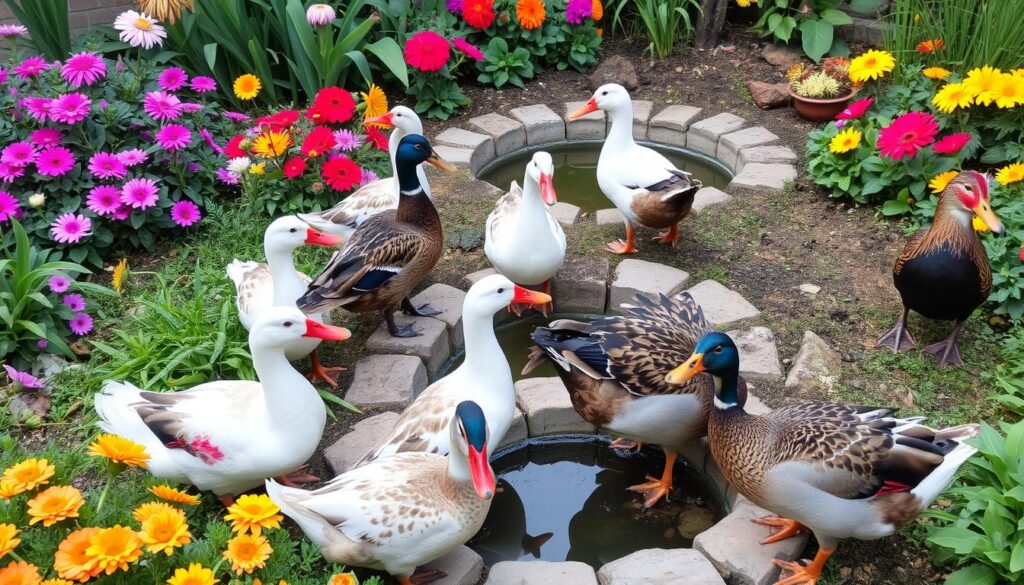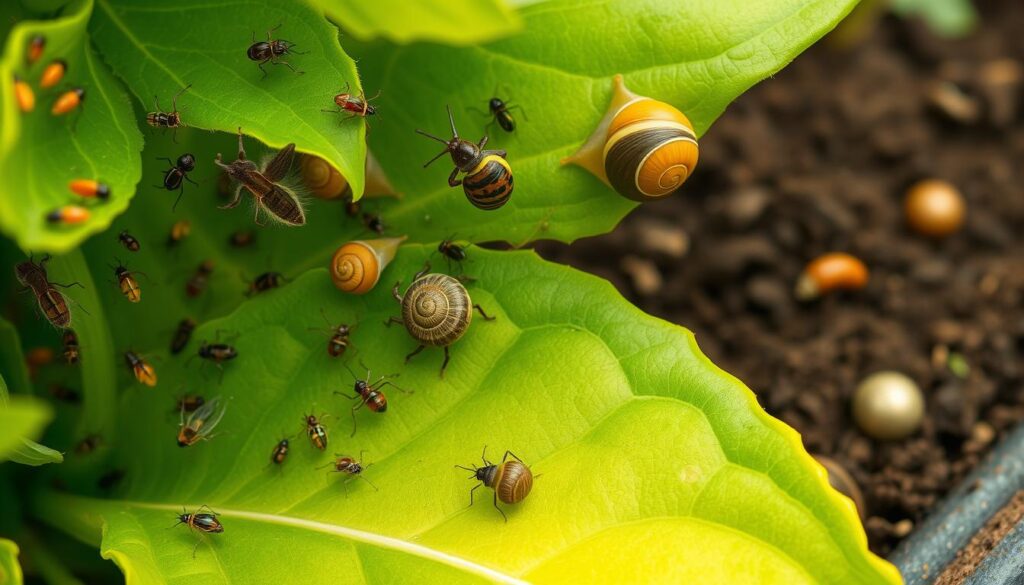Did you know there are over 25 domestic duck breeds to pick from? Choosing the right ducks for your garden can seem hard. But, this article will guide you to the top breeds perfect for pet owners and backyard gardens.
The best duck breeds are friendly, lay lots of eggs, forage well, and fit in small spaces. These are key factors to consider.
Key Takeaways
- There are over 25 domestic duck breeds to choose from for your garden
- The best duck breeds consider factors like friendliness, egg production, foraging abilities, and space requirements
- Indian Runner ducks can lay up to 200 eggs per year, making them a prolific option
- Call ducks are popular but tend to be poor layers, producing only around 30 eggs annually
- Khaki Campbell ducks are known for their exceptional egg-laying capabilities
Introduction to Keeping Ducks in the Garden
Ducks are not just fun garden friends but also help the backyard. They are friendly and enjoy being around people. They also help control pests and make the soil better with their manure. But, they can be messy and need a good home.
Why Ducks Make Great Garden Pets
Ducks love to be with others and are very entertaining. They make the garden more lively with their playful nature. They are great companions and add joy to the outdoor space.
Benefits of Having Ducks in Your Garden
- Effective pest control: Ducks are great at eating pests like Colorado Potato Beetles and other insects.
- Soil fertility enhancement: Their manure makes the soil better, helping plants grow and keeping the garden healthy.
- Low-maintenance companions: Ducks are less destructive than chickens and easier to care for in the garden.
Ducks can be wonderful in the garden, but they need the right home. By giving them a good place to live and taking care of them, gardeners can enjoy many benefits. These include pest control, better soil, and a lively atmosphere.
Best Duck Breeds for the Garden
Adding a touch of avian charm to your garden is easy with the right duck breeds. Some breeds are great for laying eggs, while others are easy to care for. Let’s look at the top duck breeds perfect for your garden.
Indian Runner Ducks
Indian Runner ducks are known for their upright stance and fast movements. They lay a lot of eggs, around 300 per year. Their size and energy make them great for small gardens.
Call Ducks
Call ducks may be small, but they have big personalities. They are cheerful and friendly, making them great pets or show birds. Their size and adaptability make them a joy in the garden.
Khaki Campbell Ducks
The Khaki Campbell is a top egg-layer, laying 5-6 eggs a week. They are also good foragers and easy to care for. This makes them a great choice for your garden.
| Breed | Egg Production (per year) | Foraging Abilities | Temperament |
|---|---|---|---|
| Indian Runner | ~300 | Excellent | Active, Calm |
| Call | 150-200 | Good | Friendly, Lively |
| Khaki Campbell | ~260 | Excellent | Docile, Low-maintenance |
Choosing the right duck breed for your garden can bring many benefits. From controlling pests to providing eggs, these ducks can enhance your outdoor space.
Indian Runner Ducks
Indian Runner ducks stand out with their unique upright posture and slim build. They are a great fit for any dog-friendly garden. These active ducks love to forage, making them perfect for your garden’s grassy areas and ground cover.
Characteristics of Indian Runner Ducks
These ducks are egg-laying machines, producing over 200 eggs a year. They’re also very hardy, handling different weather well. This makes them great for keeping your dog yard clean and easy to maintain.
Advantages of Indian Runner Ducks for the Garden
- Effective pest control through their active foraging behavior
- Steady supply of fresh eggs for the household
- Adaptability to various weather conditions, ensuring year-round presence
Indian Runner ducks are not just good for the garden. They’re also fun to have around. They’re perfect for adding life and practical benefits to your outdoor space.
| Characteristic | Value |
|---|---|
| Average Lifespan | 5 to 10 years |
| Annual Egg Production | 150 to 300 eggs |
| Egg Color | White or off-white |
| Minimum Space Requirement | 150m² for 2 ducks |
| Recommended Female-to-Male Ratio | 3 to 4 females per male |
Indian Runner ducks are a great choice for any garden. They’re good at laying eggs, controlling pests, and adapting to different weather. They make your garden a happy place for both you and your dogs.
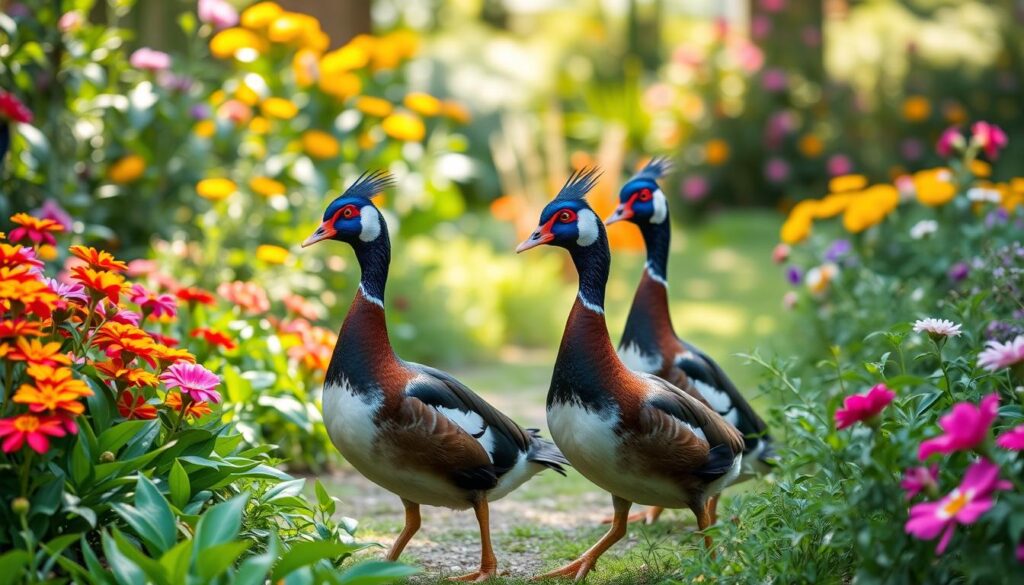
Call Ducks
If you’re looking for a charming and entertaining addition to your garden, the Call Duck might just be the perfect choice. These diminutive “bathtub-style mini-ducks” are known for their adorable, baby-faced appearance and captivating personalities. With their dark eyes and compact stature, Call Ducks have become one of the most popular duck breeds among avid duck enthusiasts.
Appearance and Personality of Call Ducks
Call Ducks are a true bantam breed, standing just 12 to 14 inches tall and weighing a mere 2 to 3 pounds. Their unique appearance, characterized by a rounded body and a short, straight beak, gives them a distinctly cute and cuddly look. Despite their small size, Call Ducks are bursting with personality, known for their friendly and entertaining behavior. These energetic ducks are not only a delight to observe but also make wonderful additions to any pet-safe landscaping or grassy areas for dogs.
One of the standout features of Call Ducks is their distinctive call, which is louder and more frequent than that of larger duck breeds. This unique vocalisation has earned them the moniker “Call Ducks,” making them a popular choice for those who enjoy the cheerful quacking sounds that these paw-friendly ground cover companions can provide.
Whether you’re looking to create a mud-free dog zone or simply want to enjoy the company of these delightful waterfowl, Call Ducks are sure to bring a touch of whimsy and joy to your low-maintenance dog yards and durable outdoor flooring for pets.
Khaki Campbell Ducks
Khaki Campbell ducks are known for laying lots of eggs. They are great for garden owners who want fresh eggs. These ducks can lay up to 300 eggs a year, more than most other breeds.
They are also good at finding and eating pests. They can eat slugs, ticks, worms, insects, and weeds. This helps keep the garden healthy and clean.
Prolific Egg Layers
Khaki Campbell ducks lay a lot of eggs. They can lay up to 300 eggs per year. Some ducks even lay an egg every day for 225 days straight.
This makes them very productive. They give garden owners a steady supply of tasty eggs.
Foraging Abilities of Khaki Campbells
Khaki Campbell ducks are not just good at laying eggs. They are also great at finding and eating pests. They can eat slugs, ticks, worms, and insects.
By foraging in the garden, they help keep it clean. They make the garden safe for pets and keep it free from mud.
| Characteristic | Value |
|---|---|
| Eggs per Year | Up to 300 |
| Egg Size | 75-85 grams |
| Fertility Rate | Around 87% |
| Foraging Abilities | Excellent |
| Flying Ability | Good |
| Meat Quality | Good |
“Khaki Campbell ducks are one of the most productive duck breeds, providing a steady supply of nutritious, flavorful eggs for the garden owner.”
Pekin Ducks
Pekin ducks are known for being friendly, making them great pets and garden additions. They are gentle and easy to get along with. This makes them perfect for pet-safe landscaping or grassy areas for dogs.
One special feature of Pekin ducks is their curling drake tail feather. This helps tell males from females. They are also hardy and lay lots of eggs, which is why they’re popular in low-maintenance dog yards and backyards.
But, Pekin ducks can face health issues like leg and joint problems, obesity, and egg-related issues. These <a keyword="health concerns are important to think about when choosing a duck breed for your dog-friendly garden.
Pekin ducks are great for beginners or as a new addition to bird flocks. People like them because they’re easy to care for. This makes them a top pick for gardening enthusiasts.
| Characteristic | Description |
|---|---|
| Temperament | Friendly and easygoing |
| Appearance | Distinctive curling drake tail feather |
| Hardiness | Known to be hardy and good layers |
| Health Concerns | Prone to leg/joint problems, obesity, and egg-related issues |
| Suitability | Suitable for beginners and as an addition to existing bird flocks |
In conclusion, Pekin ducks can add joy to your garden ecosystem. They are friendly and engaging. But, it’s important to think about their health to keep them and your garden happy.
Muscovy Ducks
Muscovy ducks are quite different from other domestic duck breeds. They are not closely related to the wild mallard. These unique birds have distinctive features that make them interesting for the garden.
Unique Characteristics of Muscovy Ducks
Muscovy ducks are larger than typical domestic ducks. Males can weigh 10 to 15 pounds, and females weigh 5 to 6 pounds. They have caruncles on their faces, a back claw on their webbed feet, and can perch like chickens.
The males have more pronounced caruncles than the females. Muscovy ducks are known for their quiet vocalizations. They make subtle sounds, unlike other waterfowl. They come from South American native birds, not mallard stock.
Muscovy ducklings need special care when young because they are sensitive to cold. These social birds do well in small flocks with at least one male and several females. They need clean water daily but are not as water-dependent as other duck breeds.
Sexing Muscovy ducks involves looking at their wing feathers and sounds as they mature. They are less prone to disease, but cold-related issues are a concern.
The distinctive features and unique characteristics of Muscovy ducks make them fascinating for any garden. Their size, perching abilities, and quiet nature offer a unique experience for gardeners.
what are the best ducks to keep in the garden
Adding ducks to your garden can be a great idea. Some breeds are better than others. The top picks are the Indian Runner, Call, Khaki Campbell, Pekin, and Muscovy ducks.
The Indian Runner duck lays a lot of eggs, over 200 a year. They are also good at finding pests in the garden.
Call ducks are small and fun to have around. They don’t lay as many eggs, but they add joy to your garden.
The Khaki Campbell duck lays up to 300 eggs a year. They are also great at finding pests.
Pekin ducks are friendly but can be loud. They need extra care to stay healthy.
Muscovy ducks are big and hardy. They can weigh up to 15 pounds. They need more space and take longer to hatch.
| Duck Breed | Egg Production | Foraging Ability | Temperament | Space Requirements |
|---|---|---|---|---|
| Indian Runner | Over 200 eggs/year | Excellent | Calm | Moderate |
| Call | 30 eggs/year | Good | Vibrant | Small |
| Khaki Campbell | Up to 300 eggs/year | Excellent | Calm | Moderate |
| Pekin | Moderate | Average | Friendly | Large |
| Muscovy | 150 eggs/year | Good | Independent | Large |
Choosing the right duck breed for your garden depends on your preferences and space. Each breed has its own special qualities. By understanding these, you can pick the perfect ducks for your garden.
“Ducks fed properly produce eggs, meat, feathers, and manure at twice the rate of chickens.”
Setting Up a Duck-Friendly Garden
Creating a safe and comfy home for your ducks is key to their happiness in your garden. Think about these important things when setting up a duck-friendly area:
Creating a Safe and Comfortable Duck Habitat
Ducks need a safe, airy place to rest, nest, and hide from bad weather. Give them enough room to move around and search for food. Make sure to protect young plants from being stepped on or having their roots messed with.
Use row covers, cloches, or temporary fences to keep delicate plants safe. Also, add raised beds, borders, or mini-hedges to keep ducks away from sensitive spots.
Providing Water Sources for Ducks
Ducks love having a steady water source, like a child’s paddling pool or a small pond. It lets them drink, bathe, and play. This is vital for their happiness and health in the garden.
Keep the water fresh and clean for your ducks. This will make sure they always have a place to enjoy.
By making a safe, comfy, and well-equipped space for your ducks, you can enjoy their company. They’ll help your garden by controlling pests, managing weeds, and enriching the soil.
Caring for Ducks in the Garden
Adding ducks to your garden can be a joy. But, it’s key to know how to care for them properly. This includes feeding, nutrition, and managing messes. Let’s dive into the important parts of caring for garden ducks.
Feeding and Nutrition for Garden Ducks
Ducks eat a mix of plants and animals. They need a diet of poultry layer pellets and wheat. But, they also love to eat foods they find in the garden.
They help control pests and weeds. This makes them great for a dog-friendly garden.
Preventing and Managing Duck Messes
Ducks can make lawns muddy. To stop this, you can give them a special area to play. This area can be concrete or a big, safe space for them to move around.
Also, cleaning the area regularly helps keep it clean. This way, your garden stays nice and tidy.
Knowing how to feed and manage messes lets gardeners enjoy having ducks. They add to the garden’s health and beauty.
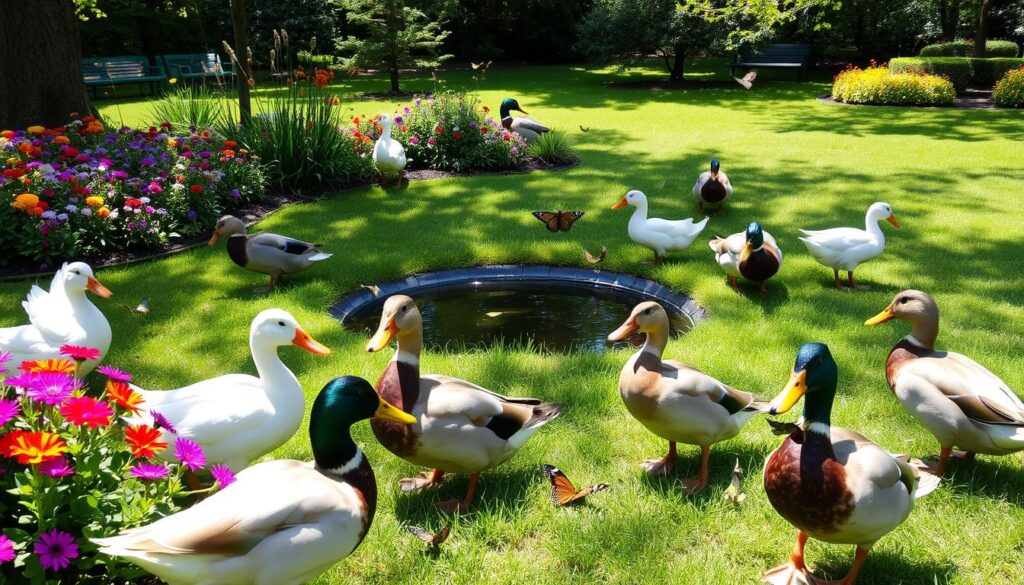
“Ducks will reward garden owners with lovely rich duck eggs for the effort put into caring for them.”
Integrating Ducks into Your Garden Ecosystem
Ducks can be great for your garden. They help control pests and make the soil better. Their manure is full of nutrients that help plants grow strong.
Using Ducks for Pest Control
Ducks are good at fighting slugs in your garden. They don’t scratch the soil like chickens do. This helps keep your garden healthy and balanced.
Enhancing Soil Fertility with Duck Manure
Duck manure is full of nutrients that make your soil better. Adding it to your soil helps your plants grow well. It makes your garden lush and green.
But, ducks can also cause problems. They might make mud or eat small plants. They need water to bathe, which adds to garden work. You need to plan well to enjoy the benefits of having ducks.
“Ducks are a wonderful addition to any garden, providing natural pest control and enhancing soil fertility through their nutrient-rich manure. With proper care and management, they can be a valuable asset to your garden ecosystem.”
Conclusion
In conclusion, we’ve looked at the best duck breeds for gardens. These include the Indian Runner, Call, Khaki Campbell, Pekin, and Muscovy ducks. Each breed has its own special traits and benefits.
The Khaki Campbell is great for laying eggs, while the Indian Runner helps control pests and improves soil. By choosing the right duck and creating a good home, gardeners can enjoy many benefits.
We’ve also learned about different duck characteristics. For example, the Welsh harlequin lays over 300 eggs a year. The Muscovy has unique wattles. This shows there are many duck options for gardens.
Moreover, we’ve discussed how to care for ducks and what they need. This includes enough light and regular cleaning. This info helps gardeners create a happy, healthy space for ducks.
In summary, ducks can be great additions to gardens. They offer many benefits and can make your garden better. Whether you want to know the best ducks for your garden or need dog-friendly surfaces, this information is helpful. It helps gardeners make smart choices and create a beautiful, sustainable outdoor space.
FAQ
What are the best duck breeds for the garden?
The top duck breeds for gardens are the Indian Runner, Call, Khaki Campbell, Pekin, and Muscovy ducks. Each has special traits like egg-laying, foraging, friendly nature, and fits well in small spaces.
What are the benefits of having ducks in the garden?
Ducks bring many benefits to gardens. They control pests, improve soil with their manure, and are fun to watch. Their friendly nature makes them great companions.
What are the characteristics of Indian Runner ducks?
Indian Runner ducks stand out with their upright posture and slim build. They love to forage and lay lots of eggs, up to 200 per year.
What are the advantages of Call ducks for the garden?
Call ducks are friendly and fun to have around. They look like baby ducks and are very popular. Their cute looks and dark eyes make them a joy to watch.
What are the benefits of Khaki Campbell ducks for the garden?
Khaki Campbell ducks lay a lot of eggs, up to 300 per year. They also help control pests and weeds by foraging. This makes them great for a healthy garden.
What are the potential downsides of Pekin ducks?
Pekin ducks are friendly but can have health issues. They might get leg problems, be overweight, or have egg-related issues. These should be considered when choosing a duck breed.
What are the unique characteristics of Muscovy ducks?
Muscovy ducks are different from other ducks. They can perch, have a longer incubation period, and are quieter. These traits make them interesting for gardens.
How can I create a safe and comfortable habitat for ducks in the garden?
Ducks need a safe, well-ventilated shelter and lots of space. Make sure they have a reliable water source for drinking and playing.
How do I manage the potential mess and muddy areas created by ducks in the garden?
Ducks can make mud baths. Use a hard area or a big grassy space for them. Regularly clean the area to avoid too much mud.
How can ducks help with pest control and soil fertility in the garden?
Ducks help control pests like Colorado Potato Beetles. Their manure also makes the soil better for plants. This supports healthy plant growth.
